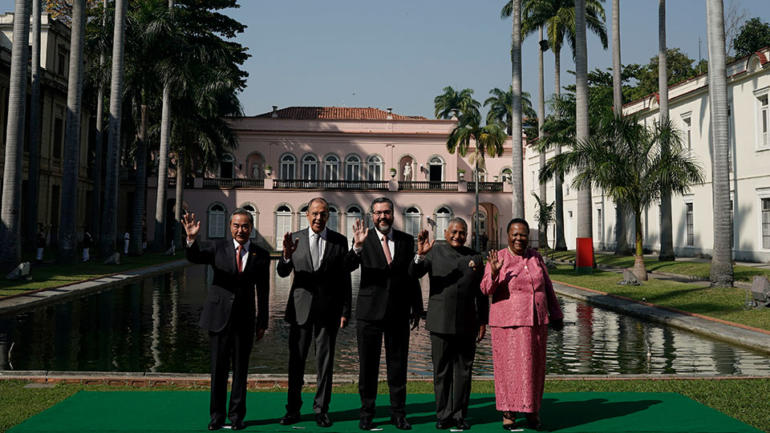Ministers of the BRICS countries gathered in Rio de Janeiro Friday to discuss arrangements for the eleventh summit of the bloc, scheduled for November 13-14 in the capital, Brasilia. Lucrecia Franco reports from Rio de Janeiro.
Brazil will be hosting a BRICS summit for a third time. Diplomats from Brazil, Russia, India, China and South Africa attended a meeting in Rio to prepare the ground for the leader’s summit later this year.
The key issues include global governance, international security, fighting terrorism and helping resolve global and regional conflicts, including the political crisis in Venezuela.
Brazil, which is the BRICS pro-tempore president, does not agree with China and Russia’s policy of non-intervention in Venezuela.
“We can’t ignore a cry for liberty that is coming from the Venezuelan people, said Foreign Minister Ernesto Araujo. “Brazil has heard that cry and I make an appeal to all of you to also hear it.”
The bloc is moving forward on many other issues. The opening in Sao Paulo of a regional office of the BRICS New Development Bank (NDB), for example, is expected to happen this year.
Prior to this meeting, the Brazilian and Chinese top diplomats, Ernesto Araujo and Wang Yi, met in Brasilia. They praised the growth in bilateral trade between the two nations. It surpassed $100-billion dollars in 2018. Wang said Brazil’s president will meet Chinese President Xi Jinping before the summit.
“We are already welcoming the visit of President Jair Bolsonaro in October this year and President Xi Jinping is extremely interested in coming to the BRICS summit in Brazil,” said Chinese Foreign Minister Wang Yi.
This will be the first time both presidents will hold an official bilateral meeting since the informal BRICS gathering that took place on the sidelines of G20 summit last month in Osaka, Japan.
Some expected friction between some BRICS countries after Brazil’s pro-Trump president, Jair Bolsonaro, took office. Brazil’s Foreign Minister, Ernesto Araujo, is an avowed fan of Trump’s too, and a critic of China. But observers say the absence of public discord at this meeting indicates the priority remains cooperation and that pragmatism will prevail over politics.
 CGTN America
CGTN America
 China’s Foreign Minister Wang Yi, from left, Russia’s Foreign Minister Sergey Lavrov, Brazil’s Foreign Minister Ernesto Araujo, India’s Minister of State for Road Transport Vijay Kumar Singh and South Africa’s Minister of International Relations and Cooperation Naledi Pandor, pose for a group photo during the BRICS representatives meeting Rio de Janeiro, Brazil, Friday, July 26, 2019. (AP Photo/Leo Correa)
China’s Foreign Minister Wang Yi, from left, Russia’s Foreign Minister Sergey Lavrov, Brazil’s Foreign Minister Ernesto Araujo, India’s Minister of State for Road Transport Vijay Kumar Singh and South Africa’s Minister of International Relations and Cooperation Naledi Pandor, pose for a group photo during the BRICS representatives meeting Rio de Janeiro, Brazil, Friday, July 26, 2019. (AP Photo/Leo Correa)
